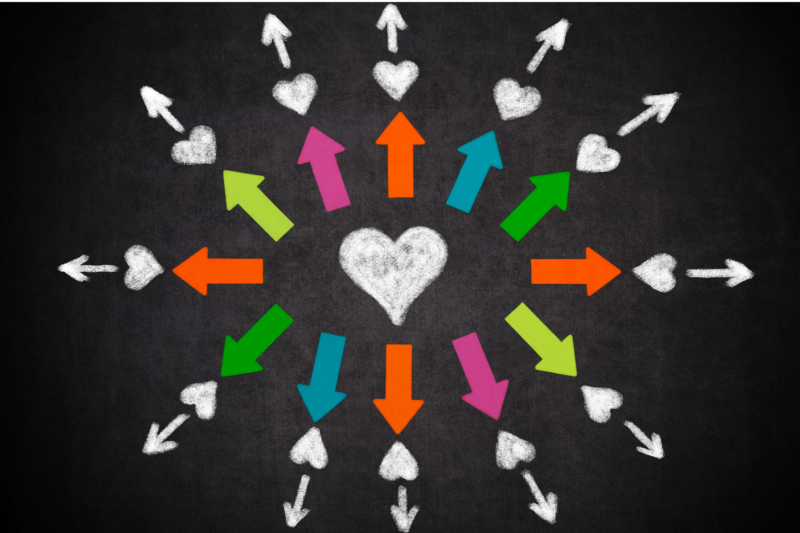
I speak and write rather a lot about self-compassion as a result of, opposite to all-too-common perception, self-compassion isn’t fluffy, or self-pitying, or self-indulgent. Self-compassion is important to psychological and emotional well-being, and by advantage of the function it might play in assist us type and preserve habits, it might additionally assist bodily well-being.
Two issues I see pals, household, shoppers, and other people at massive incessantly get unsuitable about self-compassion are that:
- They aren’t worthy of self-compassion as a result of there are different people who find themselves struggling or struggling greater than they’re. (“Certain, what occurred to me was dangerous, however different folks have it worse.”) Or,
- As a result of they’re struggling or struggling, declaring that different folks objectively have it worse someway negates their very own ache. (“Hey, skinny folks battle with weight stigma, too, so it’s not truthful to say that fats folks have it worse.”)
Be aware: I all the time use the phrase “fats” as a impartial descriptor, just like the phrases, skinny, brief, tall, Canadian, brown-eyed.
The reality is that everybody suffers at one time or one other, in a technique or one other, in methods large and small, as a result of struggling is a part of the human situation. These two issues are true on the similar time:
- When you’re struggling or struggling, that ache is actual.
- Whereas it is vital (and truthful, and type) to acknowledge that some folks will expertise extra struggling (“have it worse”) of their lives than you’ll, that doesn’t erase or invalidate your personal struggling.
Self-compassion (and compassion) are infinite sources. You don’t must battle on your slice of the compassion pie AND you don’t must deny your self compassion as a result of somebody “deserves it extra.”
The extra we observe the three components of self-compassion — mindfulness, self-kindness and customary humanity — the extra compassionate we additionally turn out to be in direction of others. It’s a win-win, not a zero sum sport.

Trying past “different folks have it worse”
I can’t even let you know how many individuals I do know who’re deeply compassionate in direction of different folks, however can’t spare an oz of compassion for themselves.
The explanation? You guessed it: “As a result of different folks have it worse.” As if to be a really giving, caring, particular person, you possibly can’t have wants your self — or should you do have them, you shouldn’t acknowledge them.
Typically, there’s disgrace piggybacking on this, a sense of lack of value that interprets to “I’m undeserving of compassion” and “My ache is insignificant…as a result of I’m insignificant.”
Once I’m working with shoppers and we join the dots between childhood occasions and present grownup challenges with meals and physique picture, and I deliver up self-compassion, I usually encounter some preliminary dismissal of “how dangerous” their experiences have been. That is true whether or not these youth experiences concerned abuse and neglect or the manifestations of weight loss plan tradition. If we’re speaking about weight loss plan tradition, this will likely have concerned mother and father or different members of the family who did any or all the following:
- Chronically dieted and/or criticized their very own our bodies
- Criticized my shopper’s physique
- Put my shopper on a weight loss plan or monitored their weight
- Praised one baby’s skinny physique whereas criticizing or “worrying about” their fats sibling
- Allowed thinner siblings to eat greater than fatter siblings
- Overtly commented on (and even harshly criticized) the fats our bodies of strangers
The justifications are many. If their mother and father dieted and criticized their very own our bodies, I usually hear, “Effectively, not less than they didn’t put ME on a weight loss plan, it might have been worse.” If the father or mother frequently displayed anti-fat bias in direction of others, then it’s “Effectively, they by no means criticized MY physique, so it might have been worse.” I additionally hear, “Sure, I want I hadn’t began weight-reduction plan at age 8, however not less than I by no means developed an consuming dysfunction.”
Sure, objectively it’s worse to develop a medical consuming dysfunction (which might be deadly) than to spend limitless time, cash and power weight-reduction plan…however the ache of being on the yo-yo weight loss plan hamster wheel for years and even a long time continues to be actual.
Sure, objectively it’s extra painful to have your father or mother criticize your physique than it’s to listen to them criticize a stranger’s physique…however there’s nonetheless ache in questioning what your father or mother thinks about YOUR physique (and suspecting that you already know what they’re pondering), even when they aren’t verbalizing it.

Weight stigma doesn’t have an effect on everybody equally
Food plan tradition and anti-fat bias (aka weight stigma) are kissing cousins, and it’s an unlucky undeniable fact that residing in an anti-fat tradition signifies that folks throughout the burden spectrum are weak to weight stigma and bias.
For thinner folks, most of this stigma can be internalized (directed in direction of your self), both due to feeling that they should “simply lose these final 5 kilos” or as a result of they concern being criticized in the event that they ever acquire weight.
For fatter folks, this stigma may be internalized (until they’ve cultivated physique appreciation and respect), however it’ll additionally come from numerous exterior sources — docs, co-workers, employers, strangers — in addition to techniques and establishments. Suppose boundaries to sure surgical procedures or therapies, theater seats that pinch, flimsy café chairs, clothes corporations that may’t be bothered to supply a really inclusive vary of sizes, gyms that assume you’re understanding to drop some pounds somewhat than merely to be robust.
Skinny privilege is actual, and regardless of how dissatisfied you’re by your physique, if you’re not less than comparatively skinny it is possible for you to to navigate this world with fewer hassles, if any.* You’ll be able to transfer via this world assured that your physique will bodily match the place it wants to suit, that you would be able to stroll into just about any retailer and discover one thing to put on, and that your intelligence and competence and well being habits is not going to be known as into query due to your physique dimension.
So everybody who struggles with internalized weight stigma and physique dissatisfaction is worthy of compassion, even when the burden of anti-fat oppression is heightened at increased weights.
*If you’re skinny and have a bodily incapacity or are neurodivergent, then this world will current you with some challenges and obstacles, as a result of it’s arrange for people who find themselves able-bodied and neurotypical. However your challenges gained’t be the identical as they are going to be for somebody who’s fats AND disabled and/or neurodivergent. That’s intersectionality at work.

Assembly everybody the place they’re at
After studying that final part, should you assume the answer to exterior and institutional anti-fat bias is to “simply drop some pounds,” I need to cease you RIGHT THERE.
Inserting the burden of systemic discrimination and oppression on the folks experiencing the discrimination and oppression is unsuitable and f*cked up, throughout the board. It doesn’t matter should you’re speaking about discrimination and oppression based mostly on weight, pores and skin shade, faith, gender, means or whatnot.
Bear in mind how I mentioned that compassion is a limitless useful resource? Displaying one particular person compassion doesn’t imply you need to present much less to another person to steadiness issues out. It doesn’t imply you need to present much less compassion to your self, both.
If somebody is struggling or struggling, whether or not it’s at their very own hand or another person’s, they deserve compassion, interval. They don’t should be advised it’s their very own fault for being within the “unsuitable” physique. They don’t should be advised that different folks have it worse. And if they’re somebody who objectively has it worse than most individuals battling one thing related — weight stigma — on this case, they don’t should have somebody with extra privilege say, “Hey, I battle, too!”
After we present compassion for, and even perhaps battle for, somebody who’s enduring extra stigma, oppression and discrimination than we’re, everybody wins, as a result of a rising tide lifts all boats.
Self-compassion sources
Listed here are some key sources for studying extra about self-compassion:
This put up accommodates Amazon Affiliate hyperlinks. As an Amazon Affiliate I earn from qualifying purchases.
Carrie Dennett, MPH, RDN, is a Pacific Northwest-based registered dietitian nutritionist, freelance author, intuitive consuming counselor, creator, and speaker. Her superpowers embody busting diet myths and empowering ladies to really feel higher of their our bodies and make meals decisions that assist pleasure, diet and well being. This put up is for informational functions solely and doesn’t represent individualized diet or medical recommendation.
Searching for 1-on-1 diet counseling? Carrie affords a 6-month Meals & Physique program (intuitive consuming, physique picture, mindfulness, self-compassion) and a 4-month IBS administration program (low-FODMAP weight loss plan teaching with an emphasis on rising meals freedom). Go to the hyperlinks to be taught extra and ebook a free intro name to see if this system is an effective match, and if we’re match!
